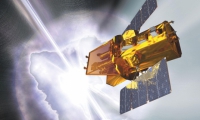Flu spreads by breathing, not only sneezing. It is easier to spread the influenza virus (flu) than previously thought, according to a new study by University of Maryland. People commonly believe that they can catch the flu by exposure to droplets from an infected person's coughs or sneezes or by touching contaminated surfaces. But, new information about flu transmission reveals that we may pass the flu to others just by breathing.
Single blood test screens for eight cancer types. Johns Hopkins Kimmel Cancer Center researchers developed a single blood test that screens for eight common cancer types - ovary, liver, stomach, pancreas, esophagus, colorectum, lung or breast - and helps identify the location of the cancer. The test, called CancerSEEK, is a unique noninvasive, multianalyte test that simultaneously evaluates levels of cancer proteins and the presence of cancer gene mutations from circulating DNA in the blood. The test is aimed at screening for the cancer types that account for more than 60 percent of cancer deaths in the U.S. Five of the cancers covered by the test currently have no screening test.
Drugs printed on demand. A team of researchers at the University of Glasgow has developed a system based on 3-D printing reactor modules for creating pharmaceuticals on demand. In their paper published in the journal Science, the group describes how the concept works and offers an overview of using their system to create an actual drug.
Intercontinental quantum communications made real. A joint China-Austria team has performed quantum key distribution between the quantum-science satellite Micius and multiple ground stations located in Xinglong (near Beijing), Nanshan (near Urumqi), and Graz (near Vienna). Such experiments demonstrate the secure satellite-to-ground exchange of cryptographic keys during the passage of the satellite Micius over a ground station. Using Micius as a trusted relay, a secret key was created between China and Europe at locations separated up to 7,600 km on the Earth.
New technique for finding life on Mars. Scientists from Canada's McGill University used multiple, miniature instruments to directly detect and analyze life. Using existing low-cost and low-weight technology in new ways, the team created a modular "life detection platform" able to culture microorganisms from soil samples, assess microbial activity, and sequence DNA and RNA.




